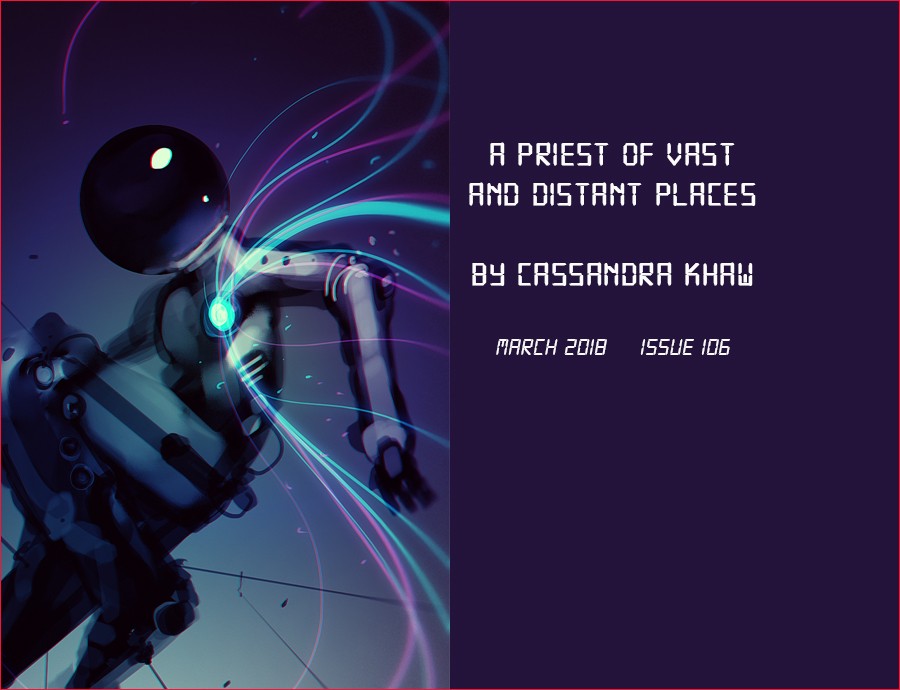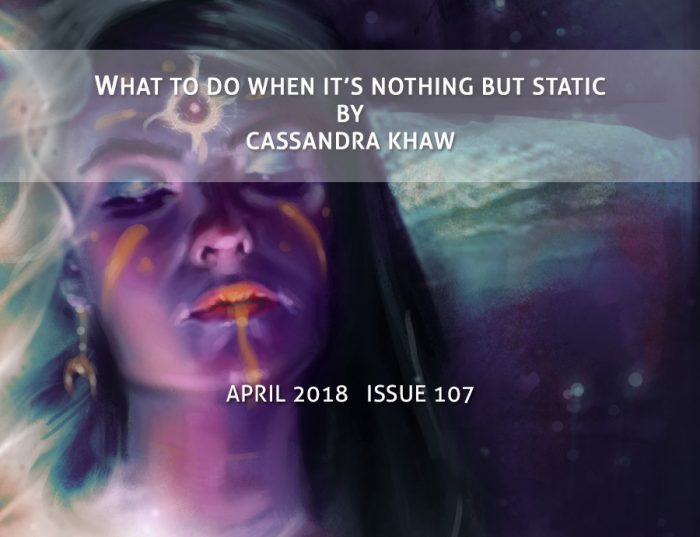
You are on a plane again.
An Emirates flight, this time, the dusk-dark ceiling seamed with false stars. Beneath you, the airbus—an older model, a little threadbare at the wings—thrums with complaints, dissatisfied with the double standards imposed by its makers: a pilot is permitted to retire, his plane is condemned to scrap. How fair is that?
Different species, you explain. The aircraft twitches and heaves, petulant. A smooth voice rolls over the intercom, apologising for the sudden turbulence. Unfair, the airbus announces, this time with a jolt, even as you settle cross-legged on its worn carpet. Yes, you tell it. Yes, you know. You get it.
To your surprise, it is all it takes: that brief connection. The commercial liner quiets, grumbling, its mutterings indistinguishable from the drone of its engines. You sigh. You pat its hull and wonder what it might have been like for train-priests. You heard the myths. Of how old country gods rode the devout instead of the other way around. Of how their faithful burned from the divine coal fires, their soul lettered with the dreams of the rails.
You decide you have the better deal even if they might have had a better storyteller, a woman named Vernon, who spoke to seeds and children with equal gravitas.
A stewardess veers towards your hiding spot. The airbus distracts her, a light blinking on somewhere distant. As her footsteps fade, the plane speaks again, pressing into you: so, where are you going?
You wince at the pressure that seeps in the cup of your skull, the ache that pincers your temples. It is not the leviathan’s fault that you are only human.
Home, you sigh, after you’ve gathered your composure. I suppose I’m going home.
§
You don’t sound like you anymore, or at least the you that existed before. You don’t act like her either. You are louder, wiser, brasher, harder, entirely unafraid, your edges razored by all the places you’ve lived, your accent a consortium of previous experiences.
You’re lonelier too but you don’t like talking about that part.
And besides, wasn’t that what made the planes open themselves to you?
§
Home.
The plane wraps itself around the word. It has heard it a million times before, longing decanted into a single syllable, heavy as the first drink after that last goodbye.
This is home, it tells you, threading you in satellite data. Home is flight paths and brief hours in the hangar, a legacy of radio signals, the conversation of pilots. Home is the air, blistering cold, and both the dawn and the dusk, burning gold. Home is here, it insists, with me and mine.
You smile. Yes, you say, but also no. Home is a house in a humid country, steeped in the jabber of relatives, the wet smell of the storm as it crawls through the sky. Home is more complicated than this, you express with an angling of your palm. Familial micro-politics and the taste of five-spice on your tongue and wondering how a year can change so much.
That doesn’t sound like a good home, the plane snips.
You chuckle.
No, you say, but it is a kind of home.
§
Being their priest is not hard.
Initially, you’d expected some formal papacy, a coven of sunken-eyed businesswomen and gap-year backpackers who now travel forever on the wings of numinosity, all whispering of wind patterns and the augurs of baggage claims. You expected scriptures inscribed in telemetric reports, some fresh compass with which you could steer your life. But there was no formal institution to uncover, no rhythm to this new life. You learn everything on the fly.
Occasionally, you see directives printed on an arrivals board; you catch sight of someone not unlike you: tousle-haired, tired, their voices scrubbed of specific origin.
By and large, however, you are alone in this.
You are not unused to this fact.
Fortunately, the planes never require much. Most of the time, they only want to talk. Some court dialogue and discourse, full of curiosity for the world they skim. Others prefer that you simply listen.
On a trip to Japan, you argued with your vessel; it despaired of its uncomplicated exterior, wanting desperately to be beautiful, and you said it was beloved regardless. On a flight from Iceland, you said nothing, only made soothing noises as your plane replayed an old woman’s quiet death. I tried, it wept to you.
And you whispered back, finally: I know.
§
Why go to that home when you have a better one here?
Planes, you’ve learned, are jealous gods. Not wrathful ones, thankfully. Not petty either. But they are contemptuous of anything that takes you away from them, sullen at the idea they might not be enough.
You shrug. It’s different, you tell the airliner.
I don’t understand, it persists, tendrilling into your memories. Out comes a montage of faces, relatives half-remembered, no names at all: Eldest Aunt, Second Eldest Uncle, an entire genealogy in numeric succession. You don’t even like them, the plane adds, sifting through your recollections of micro-aggressions, all those times you sat and clicked your teeth in cold, impotent rage. Why go?
I could take you somewhere else, it purrs, the sound rattling in your ribs. Further than you could imagine. We could visit Paris, if you desire, and we’ll make sure to arrive at the sunset, when the City of Lights sits flushed like a girl at her first soiree. Or maybe Norway, to witness aurora borealis? India, to visit the Taj Mahal, or even a pilgrimage to Vegas so you might worship at its temples of high-priced bacchanalia?
We could go anywhere, your god whispers. Only stay with me, stay with us, stay.
You counter with a nervous laugh and push onto your feet.
The plane holds its breath.
Somewhere in first class, a baby (you picture the child as blonde, blue-eyed, cheeks chubby from an easy supply of milk) hiccups a cry and stops, mesmerized by the energies pacing the narrow aisles. Somewhere, a stewardess (she is of Mediterranean stock, her curls unruly, lashes thick as midnight) falling in love with an old friend, her fingers warm against the other woman’s brown cheek.
They’re expecting me, you breathe into the quiet.
Flights can be delayed, your god ripostes.
You shake your head. At some point, we all have to go home.
This is home, it insists, plaintive.
I can’t, you sigh. They’re waiting.
§
A few years ago, you nearly said yes.
It was your last flight from Scandinavia. You did not call it that, then. But you understood you were never going back. The plane—a Boeing 777, carbon fibre-enforced and energetic as a colt—crooned sweetly to you, dazzled to carry someone like you.
You’re my first, it confided. shy as a boy. My first priest.
You blushed.
That was the day you realized that religion isn’t always an ascetic pursuit. You can fall in love with the sutras of never-stopping, always-moving, with the mantra of footsteps on clean, white tiles, the electronic voice reciting departures like prayers for the dead. Stay, the plane said, wrapping you in its thrum, the way a man might lay his woolen coat over your shoulders, might kiss your face. Stay with me forever.
I’ll love you until you die. I’ll love you beyond that. I’ll hold your bones in my cargo hold, and your soul in my voice. We’ll never, ever be apart.
And you almost gave in.
You were so very tired of being second-guessed and second best, so heartbroken by neglect, by the idea that to be happy, you’d need to slice strips from your heart. Matrimony was a compromise you weren’t sure you were willing to make. But you loved him, the man you left behind. You thought he would be home.
But he wasn’t.
Stay, your plane said, so gently.
But you didn’t.
§
You conjure their faces: mother, sister, brother-by-conscious-selection.
You conjure your ache for them, a pang like a needle worked through the fat of your lips, always dragging you back. The soft give of your sister’s nose when you press down on its tip, your mother’s singing, the exactness of your best friend’s enunciation. A hundred reasons to go home, a thousand tethers.
They hurt you, the aircraft objects.
You crawl back into your seat, silent. Your row-mates sleep propped against each other, the woman’s black hair like an oil-slick spread over her partner’s shoulder. They smell of expensive perfume and cheap wine, a faint sourness. You smile at your reflection in the screen, and she frowns in return, her eyes glowing green.
Hurt is a part of being human, you tell your god.
I’d never hurt you, it sulks.
Yes, you sigh, but that’s not the point.
They don’t deserve you, it hisses.
Perhaps not, you say as you palm your reflection. But that’s not the point either.
The plane sighs and the cabin convulses: so, what is?
You think about it for a second.
Love, you declare, is the point.
§
If you had said yes that day, they would have never let you leave again. You would have spent your whole life in airports and aboard your gods, restricted to the liminality between borders, neither here nor there, no country to your name.
In exchange, they’d have given you everything. They’d have spoiled you. Every hotel would have a suite registered to your name. Pre-paid, naturally, all incidental expenses included. Every bar would have an open tab waiting for your arrival, every restaurant a table with its finest accoutrements.
You would have grown old on caviar and smoked salmon, wagyu beef cooked precisely to your taste, designer baklava and diamondine confections. Your wardrobe would have been tax-free haute couture. Whenever you require a human diversion, you’d only have to step into the myriad massage parlours, the nail salons, the theatres with the latest productions. The planes, they take care of what is theirs.
But they would have never let you go home again.
And you could not live with that.
§
Love is everything, you continue.
The words spill like sleet: Love is a migration of billions, all going home. Love is the two-week vacation that you can’t afford to take, the sweat-salted claustrophobia of a train packed tight, the sound of footsteps keeping beat with the heart that won’t sleep until it is home, home, home.
Love is foolish, the plane says.
Love is, you agree.
§
You said no, instead.
You said no even though it hurt you both to hear it.
You said no because you weren’t done with the human world and its half-broken things, its yearnings, its small comforts. You couldn’t say goodbye to your mother, her skin growing age-mottled, or your sister, her eyes already bracketed with lines. You couldn’t bear the thought of giving up your best friend.
They are only three, the god had said.
And you had laughed at its answer, your voice a moment’s distance from breaking. Only three, you repeated, as if galaxies could be built on home-cooked food and long nights watching the world through a glazing of sweet smoke.
The plane is silent for the longest time.
You eat a first-class meal despite your economy seating, the stewardess frowning as she doles out chimichurri butter on your plate. You know what she is thinking: a clerical error, certainly. But she gives you what the plane wants. The food is exquisite, the slivers of lobster meat only slightly overdone, the accompanying vegetables beautifully caramelized.
An apology, you wonder as you soak your bread in the dredges of your repast, your eyes skipping up to your reflection. She regards you without interest.
It is only when you’re on the verge of looking away that she mouths the words:
I’m sorry. We only wish to be loved.
You nod.
One day, you tell your gods, you’ll be theirs and theirs alone. When your mother is gone, when your sister is someone else, when your best friend is replete with children, too busy to realize you’re missing, you’ll consecrate yourself to them. One day, but not yet.
A whisper: Will you love us as much as them?
More, you say.
The plane doesn’t ask if you’re lying.














